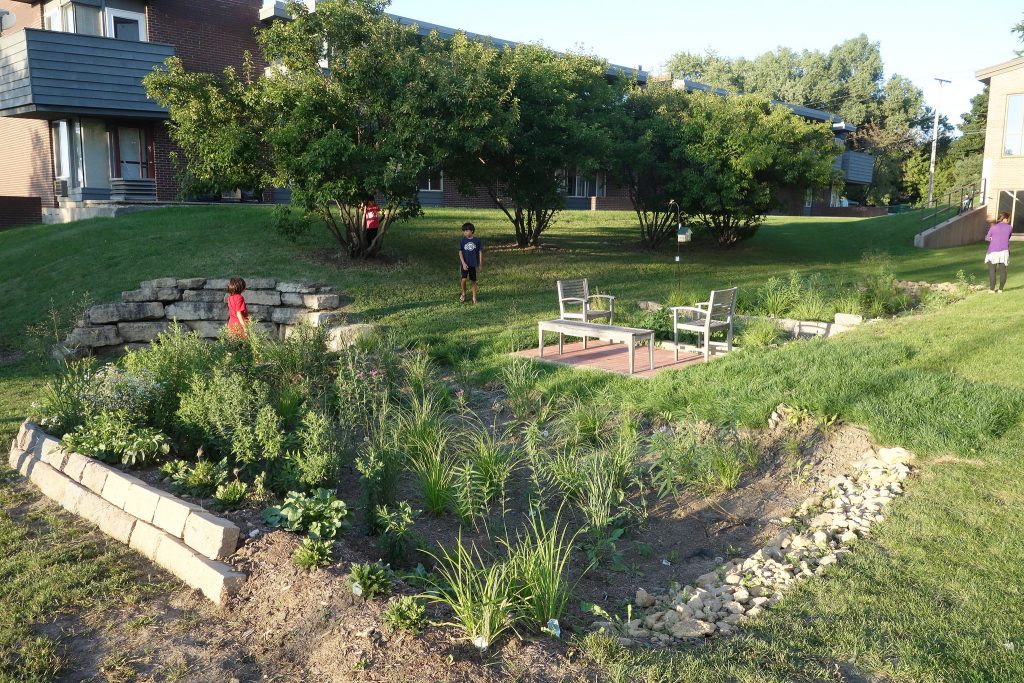Catholic Multi-Cultural Center Rain Garden – Photo by David Thompson
By Susan Frett
Throughout 2016 Friends of Lake Wingra will be asking property owners throughout the Lake Wingra watershed to do their part to help implement the Lake Wingra Watershed Management Plan (WMP). The WMP was developed by Friends of Lake Wingra over the last several years in collaboration with City of Madison Engineering and other partners. The plan contains many initiatives that need to be implemented to meet the goals of reducing phosphorus and chlorides in stormwater runoff into the lake and increasing infiltration throughout the watershed. These goals are important for the protection and restoration of Lake Wingra. Currently, high phosphorus levels cause excessive growth of nuisance weeds and algae blooms in the lake which decreases recreational usage and disrupts the lake ecosystem. Chlorides (from road salt) are toxic to aquatic life in the lake and are also contaminating some drinking water wells in the city. Infiltration of clean water is needed to protect groundwater and the springs that feed lake Wingra, capturing stormwater runoff also helps to meet the goals of phosphorus reduction.
Many of the initiatives are municipal level projects that we hope will be implemented by the City of Madison over the next several years. However, there are many things that private property owners can also do to help. We know that many of the residents of the Lake Wingra watershed love the lake and will want to help out!
We have developed an online pledging system (https://goo.gl/forms/SxSZsoLgu0) where interested residents can choose from several options to do on their own properties to help Lake Wingra. Please refer to the table below for a full list of options. People can choose one option or choose to do as many as they can. Options vary from simple activities like raking leaves out of the street, redirecting a downspout to yard or garden area and shoveling promptly after a snow storm to installing rain gardens and permeable pavement driveways. We will be collecting the addresses of people who are participating in order to evaluate our program throughout the year and to determine the effectiveness of our outreach in different areas of the watershed. Through this system you can also let us know if you would like help installing or maintaining a practice such as a rain garden on your property.
Ready to get started? Pledge your participation by filling out our online survey (https://goo.gl/forms/SxSZsoLgu0). Other options to help out with this project include volunteering (email info@lakewingra.org) and donating (https://www.lakewingra.org/make-a-donation) to Friends of Lake Wingra. We received a small grant for this project from the Natural Resources Foundation of Wisconsin’s C.D. Besadny Conservation Grant Program but we are required to fulfill a 1:1 match.
Please stay tuned to our website and Facebook throughout 2016 to stay up to date on the implementation of the Lake Wingra Watershed Management Plan!
WAYS THAT RESIDENTS CAN HELP
| Phosphorus Reduction | Chloride Reduction | Increase Infiltration |
| Never blow grass clippings into street while mowing. | Shovel promptly after a storm to avoid packing snow. | Redirect your downspout to yard or garden area. |
| Reuse leaves as mulch and compost. | Use alternatives to de-icing salt such as sand. | Collect rain water in a rain barrel or cistern. |
| Keep leaves out of street by piling them neatly on the terrace. | Use LESS. Many use 5x too much de-icing salt. | Plant a rain garden in your yard. We can offer advice and assistance. |
| Pick up and properly dispose of pet waste. | Practice safe winter driving skills, allow more time to arrive safely. | Participate in the City of Madison Terrace rain garden program. |
| Advocate for proper construction site erosion control measures. | Advocate for alternative practices, discuss salt use with your neighbors. | Help install a rain garden at churches, schools, community centers. |
| Do not feed geese or ducks. | Advocate for reduced road salt usage by municipalities. | Advocate for rain gardens on commercial properties. |
| Phosphorus fertilizers are banned in WI. Use others sparingly or not at all. | Advocate for less de-icing salt use by businesses. | Use Porous Pavement for walkways, driveways and patios. |

